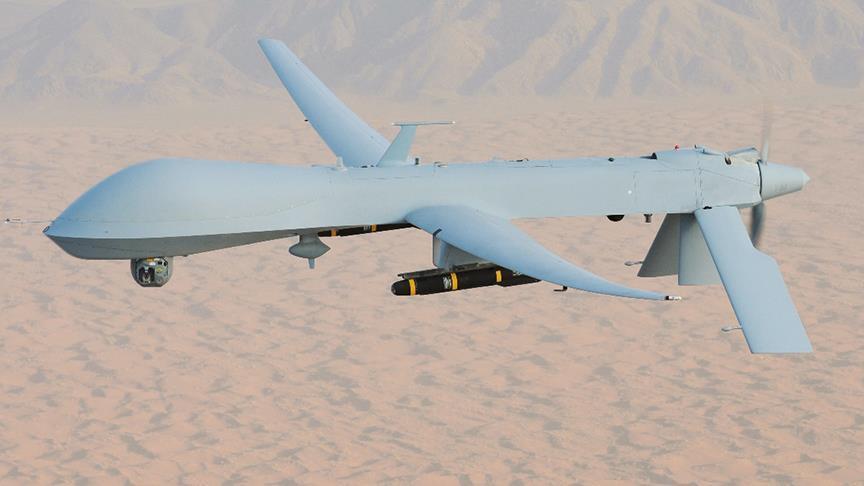Afghanistan: Taliban leader killed in US drone strike
Pakistani Taliban accuses Afghan intelligence service of providing information for this strike

By Shadi Khan Saif and Aamir Latif
KABUL, Afghanistan / KARACHI, Pakistan
A notorious leader of the Pakistani Taliban, Mullah Fazlullah, has been killed in a U.S. drone strike in the Afghan province of Kunar, officials and local media confirmed on Friday.
Hailing from Pakistan’s Swat district, the Tehrek-e-Taliban Pakistan (TTP) leader is believed to have been operating from his hideouts in the forests of eastern Afghanistan since 2009.
Mohammad Radmanesh, deputy Defense Ministry spokesman in Kabul, told Anadolu Agency that Fazlullah -- wanted under the U.S. State Department's Rewards for Justice since this March -- was killed in a drone strike carried out two days ago.
In a statement released by the TTP, the group acknowledged its leader had been killed. The terrorist group accused Afghan intelligence service NDS – long suspected by Pakistan of harboring Fazlullah – of providing information for the U.S. hit.
Lt. Col. Martin O’Donnell, U.S. Forces-Afghanistan spokesman, also confirmed the strike, telling local TOLO news: "U.S. forces conducted a counterterrorism strike, June 13, in Kunar province, close to the border between Afghanistan and Pakistan, which targeted a senior leader of a designated terrorist organization.”
The news follows a meeting between Gen. Qamar Javed Bajwa, Pakistan's powerful army chief, and Afghan President Mohammad Ashraf Ghani on Tuesday during a visit to Kabul amid renewed efforts for resuming the peace process. Leading a delegation, Bajwa landed in Kabul on the first day of a landmark cease-fire declared by the government against the Taliban.
Pakistani Taliban sources also confirmed Fazlullah’s death, saying a detailed statement would be issued within hours.
Fazlullah was chosen TTP chief in 2013 following the death of his predecessor Hakimullah Mehsud in a drone strike in North Waziristan. Also known as Mullah Radio for his fiery broadcast speeches, Fazlullah fled to Afghanistan in 2010 after the Pakistani army launched a large-scale onslaught on his Tehrik Nizaf-e-Sharia’h Mohammadi (TNSM) or Movement for Enforcement of Sharia’h in the Swat valley.
Apart from numerous terrorist attacks on Pakistani forces and civilians, he is also considered the mastermind of the 2014 massacre of over 140 children at an army-run school in Peshawar.
Pakistani media called his death the “end of a terrorist era”.
Trust-building measure
Pakistan termed the killing of Mullah Fazlullah a significant development in the war against terrorism saying “finally action has been taken against an enemy of the people and the state of Pakistan”.
“This news has been received throughout Pakistan with relief as Pakistanis have borne the brunt of TTP’s terrorist action," Pakistan's caretaker Prime Minister Nasir ul Mulk told Ghani who made telephonic contact with Pakistan’s top civilian and military leadership to confirm the death of Mullah Fazlullah on late Friday evening, according to a statement from the prime minister's house.
Ghani also telephoned Pakistan's army chief, who termed the killing of the militant commander a “positive development” which “gives relief to scores of Pakistani families who fell victims to TTP terror including the massacre of army public school (Peshawar) school (in 2014)", according to statement from Pakistan Army.
Analysts see the killing of Pakistan’s most wanted militant as a large confidence-building measure vis-a-vis Pakistan’s otherwise sour relations with the U.S. and Afghanistan.
“This is not only a big development in terms of the war against terrorism but a huge confidence-building measure to bridge the trust deficit between Pakistan and the other two allies,” retired Brig. Mahmood Shah, an Islamabad-based defense analyst, told Anadolu Agency.
Islamabad and Kabul have long accused each other of harboring terrorists. Washington, for its part, accuses Islamabad of providing safe havens to the powerful Haqqani network, a group involved in numerous brazen attacks on foreign forces in the war-ravaged country in recent years.
Pakistan, however, denies the charge, and itself accuses the U.S. of turning a blind eye to militants who attack Pakistani forces and civilians from Afghan soil.
“Pakistan has long been demanding action against him [Fazlullah], which finally has been taken. This, I reckon, shows a change in the U.S.’ anti-Pakistan policy in the region, mainly in Afghanistan,” Shah observed.
Also, he added, the development could also accelerate ongoing efforts to reduce diplomatic tension between Pakistan and Afghanistan.
Anadolu Agency website contains only a portion of the news stories offered to subscribers in the AA News Broadcasting System (HAS), and in summarized form. Please contact us for subscription options.

